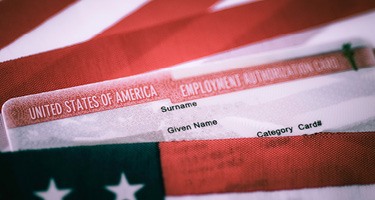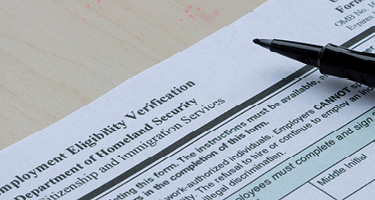Every year, as tens of thousands of individuals come to the U.S. fleeing persecution and torture in their home countries, the asylum system in the U.S. is put to the test. Individuals can pursue asylum either affirmatively through the Asylum Office, a branch of the U.S. Citizenship and Immigration Service (“USCIS”), an agency of the Department of Homeland Security (“DHS”) or defensively through the Immigration Court in the jurisdiction where they live. Immigration Courts are administrative courts housed with the Executive Office for Immigration Review (“EOIR”), an agency of the Department of Justice (“DOJ”). An individual can typically pursue asylum affirmatively if they entered the U.S. with a visa or they are present in the U.S. and changed circumstances in their home country necessitate applying, but they are not in removal or deportation proceedings. In most scenarios, an individual must pursue asylum defensively if they have already been placed into removal or deportation proceedings, as EOIR has jurisdiction over their case.
The asylum system, whether affirmative or defense, has been overwhelmed in the past decade, with far more asylum seekers pursuing their right to asylum than adjudicators who can handle their claims. The American Immigration Lawyers Association, or AILA, estimated in August 2023 that there are more than 1.3 million cases backlogged before EOIR. While not all of those cases are asylum seekers, this is more than one million individuals the U.S. is actively seeking to deport from the United States, some of whom have viable claims or forms of relief. In an effort to address these substantial backlogs, the Biden Administration has not only sought to expand EOIR and DHS’ Immigration and Customs Enforcement (ICE) Office of Principal Legal Adviser (OPLA) by hiring more judges and prosecutors to handle these cases, but the administration has sought to enact prosecutorial discretion policies for ICE to follow to determine who the agency can and should target for deportation.
DHS Secretary Alejandro N. Mayorkas issued a memorandum on September 30, 2021, titled “Guidelines for the Enforcement of Civil Immigration Law” followed by an additional memorandum on April 3, 2022, issued by Kerry E. Doyle, Principal Legal Adviser of OPLA to guide OPLA attorneys, typically referred to as ICE Chief Counsel, on the civil immigration enforcement priorities and who specifically chief counsels should target, namely the following groups:
- Priority A: Threat to National Security
- Priority B: Threat to Public Safety
- Priority C: Threat to Border Security, which includes individuals apprehended at the border after unlawfully entering after November 1, 2020.
While the U.S. District Court for the Southern District of Texas initially enjoined Secretary Mayorkas’ memorandum in June 2022, the Supreme Court reversed the lower court in U.S. v. Texas, 143 S. Ct. 1964 (2023) and held that Texas and Louisiana lacked standing to sue and upheld the Executive Branch’s inherent authority to set enforcement priorities and exercise prosecutorial discretion, thus reinstating the memorandum.
Since the Supreme Court’s decision, OPLA attorneys are filing motions to dismiss before Immigration Courts for any and all individuals who do not fall within the three priorities outlined above. The result of this is clearing through the court’s substantial 1.3 million case backlog, but also dismissing proceedings and thus terminating pending asylum applications filed defensively. Individuals in this scenario can and are encouraged to refile their asylum applications affirmatively before the Asylum Office. However, the Asylum Office is already overwhelmed with unforeseen backlogs.
Early on in my career, it was not uncommon to have a newly filed affirmative asylum applicant interviewed within 3-12 months from the time the application was filed. In the past decade, the Asylum Office has not grown to keep up with the number of new asylum seekers, and many individuals wait upwards of 8-10 years for their case to be interviewed. My oldest pending affirmative asylum case, for example, was filed in July 2015 and has yet to be scheduled for an interview. On top of these substantial delays, crises around the world arise, causing the Asylum Office to refocus efforts and interview individuals from countries of current conflict, as it is currently prioritizing cases for Afghan and Ukrainian individuals. The office in 2018 changed from a “first in, first out” policy to a “last in, first out” policy, but even then, the sheer number of asylum applications received each month vastly outweighs the office’s ability to timely schedule interviews. With the exception of an Afghan family I represented, none of the cases I personally filed from the “last in, first out” policy in 2018 to the present date have been scheduled for interview.
While EOIR and DHS are working hand in hand to clear the 1.3 million backlog of cases pending before immigration courts around the country, the already overwhelmed Asylum Office is going to be overrun with additional applicants pursuing asylum, and it simply cannot keep up. DHS needs to not only focus on its enforcement priorities but also on providing its agencies sufficient resources to adjudicate its cases in a timely manner. If asylum seekers are not interviewed for a decade or more after they file, witnesses and evidence can disappear or be more difficult to obtain, trauma affects memory and the ability to recall specifics of the persecution and torture that took place and conditions in the home country may change, thus harming the claim or making the circumstances more dire.

Murali Bashyam is the Managing Partner of Bashyam Global Immigration Law Group in Raleigh, North Carolina. He earned a Bachelor of Arts, cum laude, in Economics from Wake Forest University, Winston-Salem, North Carolina; and a Juris Doctor from the Wake Forest University School of Law. Murali has been practicing in area of corporate immigration law for over 20 years.

Allison Lukanich is the family immigration and removal defense attorney at Bashyam Global Immigration Law Group in Raleigh, North Carolina. She is a graduate of Elon University School of Law in Greensboro, North Carolina, and is a Board-Certified specialist in Immigration Law.


































